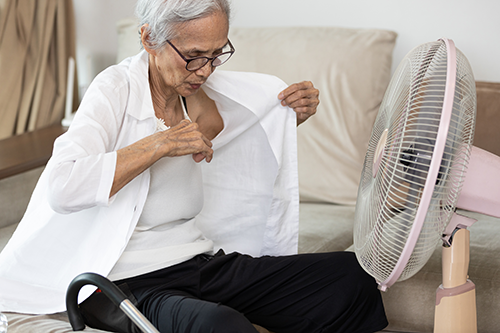
Welcome back to our Manor Lake Hickory Flat senior assisted living and memory care blog! Our goal today is to have every reader reconsider the effects of extreme weather upon our Woodstock area memory care loved ones. August is here, and extreme heat is a real threat to all of us.
Changes in the weather can greatly impact someone living with dementia. The elderly become vulnerable when it comes to extreme weather changes. Brain function can slow down, and it becomes difficult to regulate body temperature. In this blog, we want to help make you aware of how individuals living with dementia may feel when it comes to warm or cold weather!
The Hot Weather Impact
A person with dementia may not understand how to dress for weather changes. There are effects of hot weather on people with dementia that they may not understand. Deaths of the elderly during heat waves have been caused by heart failure.
Dehydration can occur in dementia patients because they may not be able to recognize when they're thirsty. They don't remember they need to drink more fluids to prevent dehydration. If dehydration does occur, it can leave toxins in the bloodstream. This causes the kidneys and liver to work overtime. When these organs work overtime, it can cause the urinary tract to become exposed to infections.
Heatstroke can happen if the senior has problems with their circulation and takes medications. This combination can cause the person to not being able to sweat so the body can cool itself off. If the body can't cool itself, then heatstroke can occur.
How to Prevent Overexposure to Heat
To prevent overexposure to heat, make sure your loved ones are drinking plenty of fluids to stay hydrated. Avoid drinks with caffeine or sugar, these only lead to even more dehydration and more frequent urination.
Proper ventilation is also going to be a key part of keeping the elderly cool. Make sure air conditioners are working properly before the heat comes. Be sure to check on individuals with dementia to make sure they aren’t showing signs of heatstroke. A few symptoms could be nausea, headache, dizziness, or disorientation. If signs of heatstroke are present be sure to try putting a wet cloth on the back of a person’s neck will help to regulate body temperature. Also, a lukewarm shower or bath will help to lower body temperature.
The Cold Weather Impact
File this away for a few weeks from now, but important considerations right now none the less. Cold weather can cause a person with dementia to become agitated, depressed, or distressed. If the person has sundowners, the new lack of sunlight can exacerbate it. Sundowning occurs at the end of the day and shows in acts of anger, irradiation, and aggression when the sun starts to set. With the long nights of winter, the behavior of a person with sundowners can become more difficult to deal with.
A person with dementia can start to have sleep disturbances. This happens because dementia interferes with the part of the brain which controls the internal body clock. When it starts to get dark early, it can cause confusion. They may want to go to bed at 5 pm but then will be awake during the middle of the night.
Because dementia can cause visuospatial problems, shadows, and dim lights can cause even more confusion and disorientation. A person with dementia may think they see a person or object which isn’t there. This can cause the person to become even more agitated.
Ways We Can Help Cope
A person with dementia should go outside, under supervision, whenever possible in the natural light. It will boost their mood and help reduce tension and stress. Plus, as the natural light fades, be sure the rooms in the house are brightly lit to control shadows and reflections.
Whatever room the person spends the most time in, keep it calm and relaxing during the late afternoon and into the early evening. Try to keep the evenings soothing and low-key.
Being a caregiver to a loved one with dementia is a full-time job. If you need assistance, Manor Lake can be the perfect place to call home. Contact us, anytime, for any reason!

